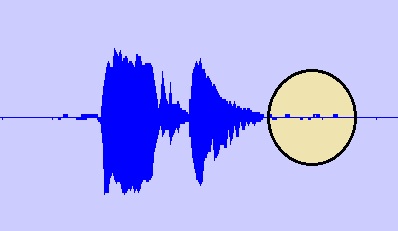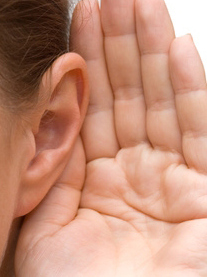 For
some of us, the wave form (at right) is a familiar gremlin. It's
the result of a jaw pop. For
some of us, the wave form (at right) is a familiar gremlin. It's
the result of a jaw pop. To hear what it sounds like on an audio track, listen for the faint, hollow pop that follows the word "You" in "Thank You" in this looped clip: click here. For me, this annoying mouth noise makes an unwelcome appearance when I'm tired, dehydrated or tense. Several of my voice over colleagues have told me that they also cope with this problem. Here's how we solve it. We either:
QUICK ANATOMY LESSON Doctors who specialize in treating "jaw pops" call this condition temporomandibular disorder (TMD). Here's a simple anatomy lesson that explains the mechanics involved:
For voice actors, the most annoying part is the clicks, pops and grating noises that our ultra-sensitive microphones "hear." STOPPING AT SOURCE If you're cleaning up mouth noise from TMD on your audio tracks, the following remedies may help you stop these sounds at the source:
Yes, an ounce of prevention is worth a pound of cure. But if you need a pound of cure - because those wave-form gremlins are still popping up - there are a variety of options open to you. Most voice over software programs offer a range of remedies for mouth noises. Training tips for the more popular programs are beyond the scope of this article, but stay tuned to VoiceOverXtra for Dan Lenard's upcoming webinar on Cleaning Up Your Audio. In the meantime, I'm told that iZotope RX™ 2 editing software is the software of choice for "jaw poppers." This is an audio repair toolkit that will help you suppress and remove unwanted noises. For details, please consult vo tech blogs and see iZotope RX™ 2's website at: www.izotope.com/products/audio/rx. For more on Temporomandibular Joint Disorder (TMD), please consult your physician, or see Web MD's helpful summary and recommendations by clicking here. -----------------------------------------------------  ABOUT ELIZABETH ABOUT ELIZABETHElizabeth Holmes is a writer, voice actor, and staff editor at VoiceOverXtra, based in Northern California. She is also editor of VoiceOverXtra's book division, including Voice Over Legal, by voice actor / attorney Robert Sciglimpaglia. For earlier columns in this series, please type "Sounds Odd" in the SEARCH box at the top of this web page. Email: elizabeth@HolmesVoice.com |
|
As of the NEW website launch, 03/22/2012

 SOUNDS ODD
SOUNDS ODD



.png)




Joel -- Thanks for the feedback on RX 2. It was recommended to me by another 'jaw popper' who said the same thing: "Works great, but requires work!"
Fred -- In the course of researching this article, I was surprised to learn that neck cricks (from holding a phone against your ear, for example) could cause jaw popping problems. It makes sense that chiropractic adjustments would bring relief. Thanks for sharing this.
It's your doctor's scalpel for audio repair!
http://www.upenn.edu/gazette/1109/expert.html